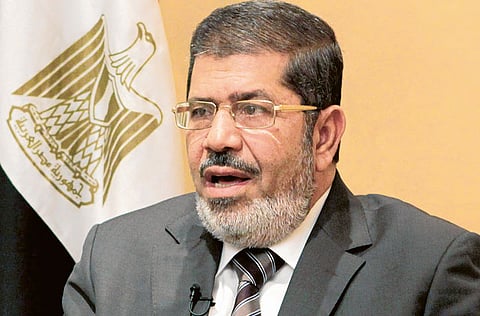Mursi’s 100-day challenge
Egyptian president must focus on building the foundations for future accomplishments

Egyptian President Mohammad Mursi has taken a crucial step towards building his government with the appointment of Hesham Qandil as prime minister. One month into his term, Mursi has yet to consolidate authority. As he tries to strengthen civilian rule through effective governance, Egypt’s first democratically elected president would do well to learn from America’s vast experience with presidential transitions, beginning with three important lessons.
First, he should avoid the ‘first 100 days’ trap. Ever since Franklin D. Roosevelt’s fabled first 100 days in office, blockbuster successes in the first three months of an administration have become the Holy Grail of presidents. In reality, the first 100 days ought to be a time for building the foundations for future accomplishments, not racking up career-defining wins for media consumption.
Apparently the 100-day fever has spread to Egypt, as Mursi has promised to implement what he calls a Renaissance Project in his first months in office, including police reform, traffic reduction, better sanitation, improved supplies of bread and fuel regulation.
As he took office, Qandil cited fulfilment of these goals as his priority. Yet such an ambitious agenda is both quixotic and potentially dangerous because of the high expectations it sets. Young Egyptians have already established a website, Mursimeter.com, to track how many of these promises Mursi achieves (so far: 1 of 64). Even in the US, where new presidents may face a hostile Congress — a stumbling block that pales in comparison with Egypt’s dissolved parliament, combative military leadership and assertive high court — political reality often foils early-term initiatives.
As president, Bill Clinton suffered early setbacks, on ‘don’t ask, don’t tell’ and on an unpopular economic stimulus package filibustered by Republicans. George H.W. Bush fought a bruising nomination battle for his defence secretary pick, John Tower, whom the Senate ultimately rejected. Perhaps surprisingly, it was the lack of an ambitious agenda that distinguished Ronald Reagan’s first 100 days as relatively successful and positioned him well for future accomplishments.
Second, Mursi should beware campaign commitments. In the frenzy of campaigning, candidates inevitably say things that make better sound bites than sound policy; this is politics as usual in mature and fledgling democracies alike. New presidents’ greatest mistakes come not from glib promises, but from abiding by those commitments when faced with the reality of governance. Such a mistake is most perilous in the realm of foreign policy.
During his race against Ahmad Shafiq, Mursi used at times bellicose rhetoric towards Israel, accusing it of violating the Camp David accords, asserting that “it is not possible for a country of five million to intimidate 90 million”, and sitting onstage at a rally while an associate promised the crowd that “Mursi will liberate Gaza”.
To take such rhetoric further in confrontations with Israel would be deeply problematic for Egypt. Indeed Mursi would be wise to avoid the mistake made by J.F.K. Kennedy, who promised during his campaign to be tougher than Dwight Eisenhower and Richard Nixon on Cuba and — despite his better judgment — wound up carrying out the doomed Bay of Pigs invasion.
Woo the bureaucracy
Third, Egypt’s new leader should court the bureaucracy. Bureaucrats are the engines driving policy implementation, but they are too often overlooked by incoming administrations. Egypt watchers are scrutinising Mursi’s cabinet picks, but it will be sovereign ministries, staffed by civil servants, and the state media that determine the fate of his initiatives.
Jimmy Carter learned this lesson the hard way when, after winning over voters with his Washington-outsider status, he tried to remodel the federal bureaucracy, resulting in a mutual estrangement that stymied his agenda. This dynamic was especially damaging to his human rights agenda, which never took hold after the career foreign policy establishment was sidelined by his consolidation of national security decision-making power under Zbigniew Brzezinksi in the White House.
The antidote is outreach to the bureaucracy. Nearly the only source of institutional knowledge and expertise, bureaucrats are essential to a successful transition. President Barack Obama signalled their importance by embedding review teams in executive agencies during the pre-inaugural period to leverage bureaucratic know-how; once in office, the First Lady engendered goodwill with early-term visits to federal agencies.
Mursi isn’t the only leader trying to wrangle an embryonic democracy out of the shadow of autocracy; Tunisian and Libyan politicians face similar transitional challenges. Although critics everywhere are fond of pointing out the many unappealing facets of US democracy, the repeated and peaceful transfer of power between political rivals is among the most admirable events in American politics.
This tradition offers invaluable lessons to the new democracies born of the Arab Spring.
— Los Angeles Times
Rebecca R. Friedman is a former research associate at the Council on Foreign Relations and a doctoral student at Georgetown University. Her study of the Eisenhower-Kennedy presidential transition was published in Presidential Studies Quarterly.


